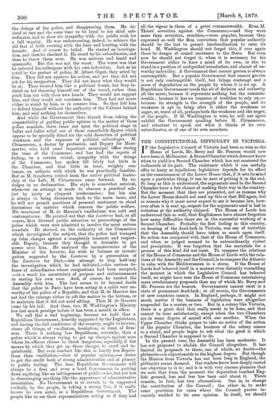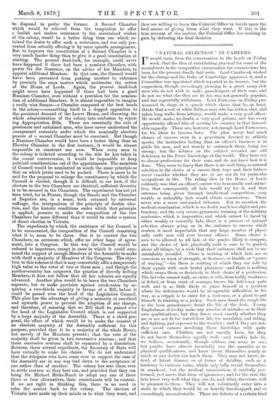THE CONSTITUTIONAL DIFFICULTY IN VICTORIA.
I F the Legislative Council of Victoria had been as wise as the House of Lords, Mr. Berry and Mr. Pearson would now have been at Melbourne. A Second Chamber which does not know when to yield is a Second Chamber which has not mastered the rudiments of its part. The resistance which it can usefully offer to hasty or injudicious legislation depends for its effect on the consciousness of the Lower House that, if it sets its mind upon a particular thing, it can be sure of getting it in the end. So long as this is understood, the arguments used in the Second Chamber have a fair chance of making their way in the country. But the moment that they are presented, not as reasons why the Lower House should not send up this or that Bill again, but as reasons why it must never expect to see it become law, how- ever often it is sent up, respect for the arguments used is lost in irritation at the authority claimed. The House of Lords has understood this so well, that Englishmen have almost forgotten how many difficulties there are in the successful working of a Second Chamber. Probably the first feeling in this country, on hearing of the dead-lock in Victoria, was one of irritation that the Assembly should have taken so much upon itself. Its action was compared with that of the House of Commons, and when so judged seemed to be extraordinarily violent and precipitate. It was forgotten that the materials for a process of this kind did not exist. To compare the relations of the House of Commons and the House of Lords with the rela- tions of the Assembly and the Council, is to compare the Atlantic in calm with the Mediterranean in a storm. If the House of Lords had behaved itself in a manner even distantly resembling the manner in which the Legislative Council has behaved itself, we might have seen the House of Commons entertaining more revolutionary proposals than any of which Mr. Berry and Mr. Pearson are the bearers. Governments cannot exist in a state of permanent dead-lock; at all events, the Governments of new countries cannot. In England, perhaps, it might not much matter if the business of legislation were altogether suspended for a sessien or two. But in a colony like Victoria, there is a great deal that really needs to be done, and that cannot be done satisfactorily, except when the two Chambers are in some degree of accord with one another. When the Upper Chamber thinks proper to take no notice of the action of the popular Chamber, the business of the colony comes to a stand, and people begin to ask what the good is which a Second Chamber is supposed to do.
In the present case, the Assembly has been moderate. It has not proposed to abolish the Council altogether. It has limited its proposals to three, one of which, no doubt—the plebiscite—is objectionable in the highest degree. But though the Mission from Victoria has not been long in England, the plebiscite seems- doomed. Our readers know how deeply rooted our objection to it is ; and it is with very sincere pleasure that we note that from the moment the deputation touched Eng- lish ground, less and less has been said about it. There remain, in fact, but two alternatives. One is, to change the constitution of the Council ; the other is, to make some provision for cases where the Council proves in- curably wedded to its own opinion. In itself, we should
be disposed to prefer the former. A Second Chamber which would be relieved from the temptation to offer a foolish and useless resistance to the ascertained wishes of the colony, would be a better thing than one which re- tained the desire to offer such a resistance, and was only pre- vented from actually offering it by some specific arrangement. But to improve the constitution of a Second Chamber is a very much harder thing than to give it a good constitution at starting. The present dead-lock, for example, could never have happened if there had been a nominee Chamber, with power for the Governor, on the advice of his Ministers, to appoint additional Members. In that case, the Council would have been prevented from pushing matters to extremes by precisely the same motive which moderates the action of the House of Lords. Again, the present dead-lock might never have happened if there had been a good Nominee Chamber, even without a provision for the nomina- tion of additional Members. It is almost impossible to imagine a really wise Senate—a Chamber composed of the best heads in the colony—committing itself to a dogged opposition to the persistent demand of the Lower House, and throwing the whole administration of the colony into confusion by reject- ing Appropriation Bills. These are essentially the acts of passionate and untrained men, who have never understood the unexpressed restraints under which the nominally absolute powers of a second Chamber must be exercised. But though a Nominee Chamber would have been a better thing than an Elective Chamber in the first instance, it would be almost impossible to construct one now. When every man in the colony is ticketed according to the side he has taken in the recent controversies, it would be impossible to keep political considerations out of the appointments. The members of Council would be nominated on much the same principle as that on which juries used to be packed. There is more to be said for the proposal to enlarge the constituency by which the Council is elected, though it is difficult to see how, if the electors to the two Chambers are identical, sufficient diversity is to be secured in the Chambers. The experiment has not yet been tried, for in France, though the Senate and the Chamber of Deputies are, in a sense, both returned by universal suffrage, the interposition of the principle of double elec- tion, and the historic conditions under which that principle is applied, promise to make the composition of the two Chambers far more different than it would be under a system of direct election in Victoria.
The expedients by which the resistance of the Council is to be surmounted, the composition of the Council remaining what it is, seem to be three. One is to convert the two Chambers, on occasions which offer no other hope of agree- ment, into a Congress. In this way the Council would be reduced to impotence, except in cases in which it could com- mand the support of enough Members of the Assembly to make with itself a majority of Members of the Congress. The objec- tion to this scheme is that it may conceivably affix a dangerously high value to the votes of two or three men ; and though the mother-country has outgrown the practice of directly bribing Members, it does not follow that all her colonies are equally advanced. Another plan would be to leave the two Chambers separate, but to make provision against catch-votes by re- quiring a two-thirds majority in favour of a Bill, before it could be passed over the head of the Legislative Council. This plan has the advantage of giving a minority of one-third and upwards power to prevent the adoption of any change, and therefore, of ensuring that no Bill shall be passed over the head of the Legislative Council which is not supported by a large majority of the Assembly. There is a third pro- posal, the effect of which would be to make the consent of an absolute majority of the Assembly sufficient for this purpose, provided that it be a majority of the whole House, not merely of the Members present; that the vote of the majority shall be given in two successsive sessions ; and that these successive sessions shall be separated by a dissolution. Between these several expedients, the Secretary of State will have virtually to make his choice. We do not understand that the delegates who have come over to support the case of the Assembly are in any way tied down to the acceptance of one rather than of another. The colony has sent them over to settle matters as they best can, and provided that they can bring Sir Michael Hicks-Beach to adopt any one of these three or four alternatives, their constituents will be content. If we are right in thinking this, there is no need to refer the matter back to the colony. The electors of Victoria have made up their minds as to what they want, and they are willing to leave the Colonial Office to decide upon the best means of giving them what they want. If this is the true account of the matter, the Colonial Office has nothing to gain by deferring the final decision.



































 Previous page
Previous page